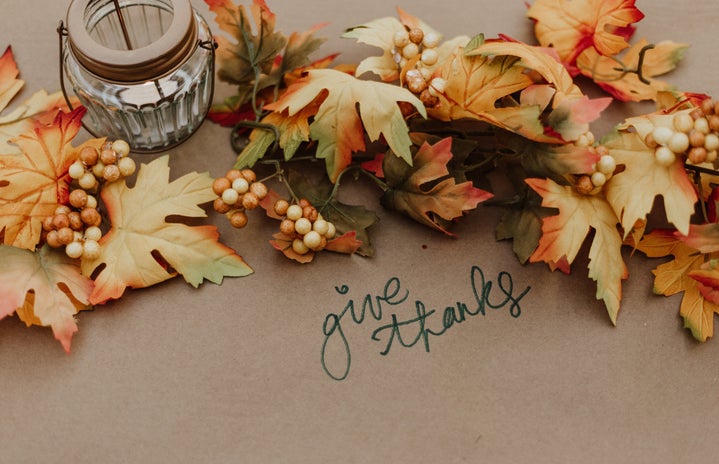Thanksgiving has evolved a lot since its origins and has become a wonderful celebration of family and good feelings; however, Thanksgiving has its roots in the colonization and genocide of indigenous folks on the North American continent, particularly the area that is the modern day United States. While I’m not advocating for anyone to stop celebrating Thanksgiving, I encourage everyone to learn more about indigenous people in America and think critically about the origins of Thanksgiving.
History of Thanksgiving
David Silverman wrote This Land Is Their Land: The Wampanoag Indians, Plymouth Colony, and the Troubled History of Thanksgiving and described the myth of Thanksgiving in a historical lens which he discussed with Smithsonian Magazine in 2019. The myth is that “friendly Indians, unidentified by tribe, welcome the Pilgrims to America, teach them how to live in this new place, sit down to dinner with them and then disappear.” The reality is that some tribes of the Wampanoag people approached the Pilgrims for an alliance after their population was decimated by European diseases, which led to a Great Dinner. This dinner was later claimed to be the first Thanksgiving by the descendants of the pilgrims who wished to retain their cultural relevance in the developing country (which at that point was still several colonies of Britain). The Great Dinner was many things, but an expression of goodwill and friendship was not one of them—both sides saw the opportunity to gain benefits from participating, and both sides felt animosity of some sorts towards each other.
Colonization, Erasure and Genocide of Indigenous People in Our America
There has been a long history in the United States of taking the land, culture and lives of indigenous Americans. During the British colonization of America, there were various treaties and alliances created between the British and different groups of indigenous Americans that were not respected by the white British folks. Treaties were often broken or formed with loopholes in place for British colonists to take advantage of indigenous Americans, and alliances were extremely one-sided in favor of the colonists.
With the introduction of Manifest Destiny in the 1800s came the push to expand the United States westward into areas where Natives had lived for ages in addition to areas where they were forcibly relocated. One instance of the forcible relocation of Natives was former president Andrew Jackson’s Trail of Tears, which was a death march of Natives from their homelands out west to make room for white settlers in the 1830s. Manifest Destiny was the direct cause of the stealing of indigenous lands by white settlers in the West and the subsequent banishment of Natives to small reservations, often in places far from their original land.
One more example of the white theft of indigenous American’s identities are the Indian boarding schools whose goals were to Westernize and “civilize” Native children. Most were run by various Christian denominations, and they, along with the federal government, coerced Native parents to send their children to these boarding schools. Once at the school, the Native children were stripped of all ties to their Native cultures—their hair was cut, they were banned from participating in ceremonies and other cultural activities, and they were forced to speak English. This traumatized the Native children, and these experiences followed them throughout the rest of their life. They passed on these experiences to their children in what is described as intergenerational trauma.
This is not a complete description of all the negative effects of white settlers on indigenous Americans, but it serves as an introduction into the impacts of colonization and American expansion.
So, What We Can Do This Thanksgiving to Acknowledge Indigenous People?
I have two suggestions for you this Thanksgiving. If you have younger family members (siblings, or cousins, for example), don’t perpetuate the “everyone got along great and had a wonderful feast” Thanksgiving narrative that is often taught to children. Talk to them about colonization in an age-appropriate way, but emphasize that we celebrate Thanksgiving for different reasons today.
Another is to volunteer to give a land acknowledgement before you eat Thanksgiving dinner. A land acknowledgement is a way to “understand the longstanding history that has brought you to reside on the land, and to seek to understand your place within that history.” It is a tool for self-reflection about your own location in the history of America and its colonizing past. Seeing that Thanksgiving is a holiday that often glosses over the important history of indigenous Americans, I think that it is extremely valuable to give a land acknowledgement before your meal. If you want some guidance on how to create an Indigenous Land Acknowledgement, check out this article by the Native Governance Center.
Geneseo has begun utilizing land acknowledgements in most of our large events, and I plan on doing some research into the indigenous lands that my hometown exists in and writing a short land acknowledgement to read at my own Thanksgiving dinner with my parents this year.
I encourage everyone to take some time to learn more about the indigenous American populations in their area this Thanksgiving season and reflect on how you can decolonize your concepts of Thanksgiving!



